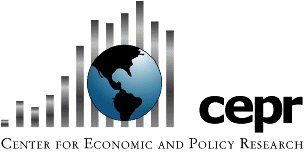
World Bank Grants Would Reduce Poor Country Debt Without Cost to U.S.
By: Robert Naiman[1]
July 23, 2001
President Bush proposed in Genoa that up to 50% of the World Bank's lending to the poorest countries be converted to grants focused on education, health care, access to clean water, and sanitation. This would be a step towards addressing the unbearable external debt burden of poor countries. The World Bank claims that the proposal would require increased contributions from the United States to compensate the World Bank for the loss of loan repayments, implying that poor countries would suffer under President Bush's proposal if U.S. contributions were not increased.
The World Bank's implication is false. If there were no increase in U.S. contributions, the resources available for World Bank loans would decrease in the future. It does not follow that this would hurt poor countries. A shift from loans to grants would not result in a reduction of net flows from the World Bank to the poorest countries, if we assume that the set of "poorest countries" is fixed for the foreseeable future. Furthermore, if 50% of World Bank loans to poor countries were converted to grants, it would reduce poor country debt by about $800 million a year. Such a debt reduction would match debt relief proposals backed by some development organizations.
The World Bank's lending arm to poor countries, the International Development Association, loaned $4.4 billion last year. These loans are about 2/3 subsidized; that is, each dollar loaned is equivalent to a grant of 64 cents and a market rate loan of 36 cents. If $2.2 billion were used for pure grants, it would result in $800 million less debt ($2.2 billion times 36 per cent.)
Of course, there would be some consequences for World Bank lending. Converting these loans to grants would cause the World Bank to have less money in the future. These loans have a 10-year grace period, so converting half of them to grants would mean that 10 years from now the World Bank would have $800 million less, in present dollars. And therefore the World Bank would have $800 million less to lend, 10 years from now.
However, focusing on the reduction in lending alone is misleading, because this would have no effect on net flows from the World Bank or from the U.S. to poor countries. The $800 million the World Bank won't have is $800 million it won't take from the poor countries. Poor countries won't be worse off as a result of not having the World Bank take $800 million from them and lend it back to them.
This wouldn't necessarily be true if, as a result of the World Bank's largesse and helpful advice, the poorest countries took off economically, so that ten years from now they were no longer needy, and at that time there were some other countries which were now the "poorest." Then it might make sense to transfer money from the formerly poor countries, now rich, to some other countries that were now poorer. But few analysts believe that such a take-off is plausible. The poorest countries are not likely to change their relative position in the world economy for the foreseeable future. Indeed, World Bank loans and advice have not enabled these countries to increase their economic growth in the past, let alone pass other countries.
There is broad consensus that a much larger share of external assistance to these countries should be directed to basic human needs such as education, health, clean water, and sanitation. Such expenditures cannot necessarily be expected to contribute to productivity and economic growth within the next 10 years. If children stay in school to age 14, then policies such as universal education and health care for children would not show up in productivity statistics for 14 years after birth. A loan for education or health care today will not necessarily create increased capacity to service debt 10 years from now, and the money to service that debt would have to be diverted from something else.
Some might favor loans over grants for other reasons. But there is no reason to expect that substituting grants to the poorest countries for World Bank loans will require more money from the U.S. or reduce these countries' access to resources.
[1] Robert Naiman is the Senior Policy Analyst for the Center for Economic and Policy Research.